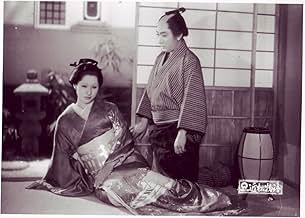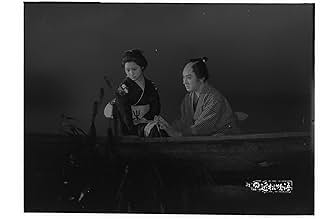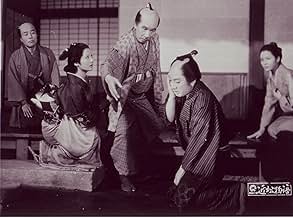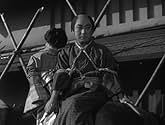IMDb-BEWERTUNG
8,0/10
5273
IHRE BEWERTUNG
Ishun ist ein wohlhabender, aber unsympathischer Meisterdrucker, der seine Frau und seinen besten Angestellten zu Unrecht beschuldigt hat, Liebhaber zu sein. Um der Bestrafung zu entgehen, r... Alles lesenIshun ist ein wohlhabender, aber unsympathischer Meisterdrucker, der seine Frau und seinen besten Angestellten zu Unrecht beschuldigt hat, Liebhaber zu sein. Um der Bestrafung zu entgehen, rennen die Angeklagten gemeinsam weg.Ishun ist ein wohlhabender, aber unsympathischer Meisterdrucker, der seine Frau und seinen besten Angestellten zu Unrecht beschuldigt hat, Liebhaber zu sein. Um der Bestrafung zu entgehen, rennen die Angeklagten gemeinsam weg.
- Auszeichnungen
- 1 Gewinn & 2 Nominierungen insgesamt
Eitarô Ozawa
- Sukeemon
- (as Sakae Ozawa)
Empfohlene Bewertungen
I saw this over 20 years ago and I remember it well. Superb photography. Great acting by the 2 leads. How things were different in that era compared to today in Japan. This is probably very hard to find on video if it exists at all. But you may see it in art houses like I did. Another Mizoguchi classic. If you like his work, I recommend The Human Condition, the greatest film ever made.
I never heard of Mizoguchi's "Chikamatsu monogatari" before until a friend of mine who loves Mizoguchi's films showed it to me recently. It is a beautiful, haunting, and emotionally involving study of forbidden love between a rigid merchant's wife, Osan, and her devoted servant, Mohei, in 17th century Kyoto. The lovers are unfairly punished for having an affair; Osan escapes her husband's home while Mohei is forced into exile. "Chikamatsu" is a highly charged work, but I'm not entirely sure if I would call it a masterpiece on par with "Zangiku monogatari", "The Life of Oharu", "Ugetsu", "Sansho dayu", and "Princess Yang Kwei Fei" - Mizoguchi's richest and most beautiful films. The photography is extraordinarily ravishing and evocative, with Mizoguchi's masterful fluid camera. Also, the sound quality of "Chikamatsu" is interestingly rich and astounding, but the film doesn't stay with you for a while like those aforementioned films. Overall, this is a minor Mizoguchi: beautiful and haunting at times, but inferior to his renowned masterpieces.
Set in 17th century Japan, and based on a 1715 play by Chikamatsu Monzaemon (hence the title, 'A Story From Chikamatsu'), this film starts with a rich scroll-maker (Eitarō Shindō) refusing to give his wife (Kyōko Kagawa) money. When she turns to one of his top apprentices (Kazuo Hasegawa), she sets in motion of a chain of events that ultimately have them fleeing together, because the apprentice, normally a virtuous man, intended to take the money from the scroll-maker and was caught.
The story reveals emotion and desire that is both on the surface, such as the scroll-maker sexually harassing a young servant (Yōko Minamida), as well as that which is concealed. It shows us the randomness of events which may cause everything to suddenly change in one's life; as the wife puts it at one point, "Nothing is more unpredictable than a person's fate. In just one day, all of this has happened to us." If you've ever had your life flip suddenly because of love, you'll identify.
The film also shows the all-too-common fate of women; the advice given to the young servant being harassed is to "Just take it. That's the duty of an employee." Adultery is also blamed first and foremost on the women ("It's frightening what women are capable of"), and it's ominous when a couple of adulterers are being led through the town to be crucified early on in the film.
It's a solid film throughout – the cast is strong, the story is well told, and there are some gorgeous scenes, one of which is in a bamboo forest. I don't think it's going to blow you away, but it's a good one.
The story reveals emotion and desire that is both on the surface, such as the scroll-maker sexually harassing a young servant (Yōko Minamida), as well as that which is concealed. It shows us the randomness of events which may cause everything to suddenly change in one's life; as the wife puts it at one point, "Nothing is more unpredictable than a person's fate. In just one day, all of this has happened to us." If you've ever had your life flip suddenly because of love, you'll identify.
The film also shows the all-too-common fate of women; the advice given to the young servant being harassed is to "Just take it. That's the duty of an employee." Adultery is also blamed first and foremost on the women ("It's frightening what women are capable of"), and it's ominous when a couple of adulterers are being led through the town to be crucified early on in the film.
It's a solid film throughout – the cast is strong, the story is well told, and there are some gorgeous scenes, one of which is in a bamboo forest. I don't think it's going to blow you away, but it's a good one.
This is certainly a good film, beautifully photographed and evocatively acted. Yet one should certainly criticize it, and Mizoguchi, for it is not without flaws and weaknesses. Mizoguchi really cared for women, and wanted to make statements on man's lack of sympathy and total cruelty, yet he sometimes gets ahead of himself in trying to make this statement by adopting the wrong means. This is certainly a case in 'the Crucified Lovers', 'Princess Yang Kwei Fei' and 'Zankiku monogatari'. He sets the scenario in feudal Japan, which leaves the viewer at the end with the partially right exclamation: "boy, does feudalism suck, I'm glad that it is over...". And true, some of the scenarios such weaker films of Mizoguchi present would be literary impossible today. Also, his women characters sometimes become archetypes of unrealistic self-sacrifice, which also simplifies the scenario less appealing. Saying that, "Crucified Lovers" is a good film, with such few relative weaknesses, though the sometimes chilly, cynical prose by Ueda, the screenwriter helps this film allot. I still highly prefer and recommend Mizoguchi's 'realistic, 'contemprary' films of 1936: 'Osaka Elegy' and 'Sisters of the Gion', as well as his late masterpieces, in which he showed more restraint and subtlety: 'Ugetsu', 'Sansho Dayu', and 'The Life of Oharu'.
I think this makes it official: no major filmmaker ever utilized lakes as well as did Kenji Mizoguchi. Between the canoe chase in Sansho the Bailiff and the suicide attempt seen in this film, it can safely be said that the Japanese director was the cinematic master of lake imagery.
The images here, by Mizoguchi and DP Kazuo Miyagawa, who also lensed many of Kurosawa's most iconic films, are consistently gorgeous. More than that, though, Chikamatsu is, I think, the most perfect encapsulation of Mizoguchi's central theme: the self-annihilating ecstasy that comes with turning one's back on an unjust social order.
Perhaps "encapsulate" is a particularly good word to use because one of the reasons the themes are so brazen is that Mizoguchi is here working on a far smaller canvas than he usually allows himself. This film is quite short by the director's standards, and deals with a smaller number of characters. Perhaps because of its less epic scope I would rank it just below the previously mentioned Sansho the Bailiff as my favorite film by this great director.
The images here, by Mizoguchi and DP Kazuo Miyagawa, who also lensed many of Kurosawa's most iconic films, are consistently gorgeous. More than that, though, Chikamatsu is, I think, the most perfect encapsulation of Mizoguchi's central theme: the self-annihilating ecstasy that comes with turning one's back on an unjust social order.
Perhaps "encapsulate" is a particularly good word to use because one of the reasons the themes are so brazen is that Mizoguchi is here working on a far smaller canvas than he usually allows himself. This film is quite short by the director's standards, and deals with a smaller number of characters. Perhaps because of its less epic scope I would rank it just below the previously mentioned Sansho the Bailiff as my favorite film by this great director.
Wusstest du schon
- WissenswertesThe movie is based on a play by the classic Japanese author Monzaemon Chikamatsu (1653-1725). The original title "Chikamatsu monogatari" means "A Tale From Chikamatsu".
- VerbindungenFeatured in Geschichte(n) des Kinos: Toutes les histoires (1988)
Top-Auswahl
Melde dich zum Bewerten an und greife auf die Watchlist für personalisierte Empfehlungen zu.
- How long is A Story from Chikamatsu?Powered by Alexa
Details
- Erscheinungsdatum
- Herkunftsland
- Sprache
- Auch bekannt als
- A Story from Chikamatsu
- Produktionsfirma
- Weitere beteiligte Unternehmen bei IMDbPro anzeigen
Box Office
- Weltweiter Bruttoertrag
- 9.311 $
- Laufzeit
- 1 Std. 42 Min.(102 min)
- Farbe
- Seitenverhältnis
- 1.37 : 1
Zu dieser Seite beitragen
Bearbeitung vorschlagen oder fehlenden Inhalt hinzufügen






























